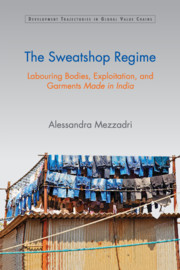Book contents
- Frontmatter
- Dedication
- Contents
- List of Tables, Figures and Pictures
- Acknowledgements
- List of Abbreviations
- Introduction
- 1 The Chain and the Sweatshop
- 2 The Commodity and the Sweatshop
- 3 Difference and the Sweatshop
- 4 The Regional Lord and the Sweatshop
- 5 The Broker and the Sweatshop
- 6 The Body and the Sweatshop
- Conclusions
- References
- Index
2 - The Commodity and the Sweatshop
Published online by Cambridge University Press: 23 July 2017
- Frontmatter
- Dedication
- Contents
- List of Tables, Figures and Pictures
- Acknowledgements
- List of Abbreviations
- Introduction
- 1 The Chain and the Sweatshop
- 2 The Commodity and the Sweatshop
- 3 Difference and the Sweatshop
- 4 The Regional Lord and the Sweatshop
- 5 The Broker and the Sweatshop
- 6 The Body and the Sweatshop
- Conclusions
- References
- Index
Summary
‘A recognition that a commodity is inseparable from its physical materiality, and that as a unit of wealth it embodies both its natural and its value form, presents a different view of capitalism.’
(Coronil, 2000, p. 356)Living in a ‘Material’ World
An enquiry into the world of sweatshops should entail some reflections over the types of commodities produced by sweatshops. These are no secondary issues for any study of capital–labour relations. Marx himself started volume one of Das Kapital with a chapter on commodities. Marx's primary aim was to insist on the social relations underpinning production and showing how the extraction of labour power – exploitation – was a crucial constitutive aspect of any type of commodity production. In Marx's words (1967, p. 72, in Coronil, 1997, p. 60), ‘the existence of things qua commodities, and the value relation between the product of labour which stamps them as commodities, have absolutely no connection with their physical properties and with the material relations arising therefrom’. Arguably, there are many ways to interpret this. One is that the physical properties of commodities have very little relation to the social process deployed to produce them. Another is, instead, that in the process of becoming commodities, things should not be viewed as simply linked to their physical status but primarily as an expression of the social relations deployed to produce them. These are fundamentally different explanations. The former suggests that physical and social ‘materialities’ fundamentally differ, while the latter instead highlights the presence of multiple, different types of ‘materialities’ epitomized by the commodity form. Marx addressed the complexities of commodity production in relation to their value. Indeed, he did insist on the twofold value of commodities in capitalist production, their use value and exchange value. Given his aim of de-fetishizing commodity production and to deconstruct the concept of ‘utility’ deployed by classical political economists, his focus was primarily on exchange value which is also the main feature of producing ‘things’ under capitalism. However, this does not necessarily mean that use value is of no relevance. It simply means that, in the sphere of production, commodities are ‘bearers of value’ (Marx, 1990, p. 143) in multiple ways.
- Type
- Chapter
- Information
- The Sweatshop RegimeLabouring Bodies, Exploitation and Garments <I>Made in India</I>, pp. 42 - 72Publisher: Cambridge University PressPrint publication year: 2016

